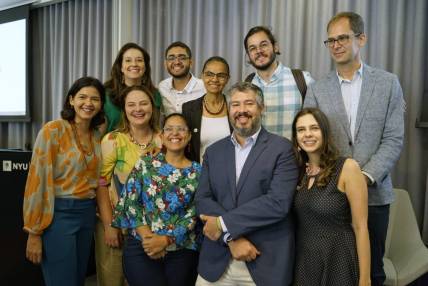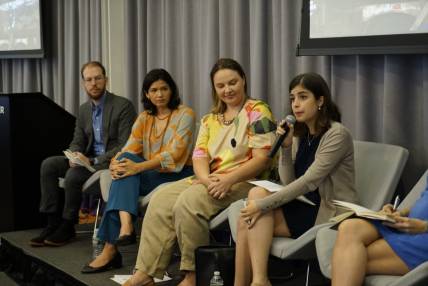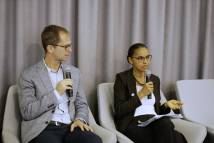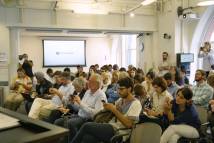NYU Wagner Gathering of Brazil Parliamentarians and Analysts Weighs Future of Amazon Rain Forest

A panel discussion at NYU Wagner on Sept. 23 weighed the future of the imperiled Amazon rainforest at a particularly volatile moment in its history – with widespread burning and despoliation, and rising global concern. During the morning forum, a Brazilian Congress member voiced her embarrassment at what she said was the Bolsonaro government’s indifference to the environment. The event was organized by Professor Salo Coslovsky, and coincided with Climate Week at the UN, where Brazilian President Jair Bolsonaro the following day would deliver an address to world leaders.
In a conversation featuring leading experts and current and former officials, Tábata Amaral, Member of the Brazilian House of Representatives, PDT, São Paulo, asked listeners for "patience with Brazil." She then noted, as reported by the Brazilian news publication Época, "there is still a democracy in the country,” despite “ideological wars" promoted by the government. She cited "resistance" efforts in her country committed to fighting for the preservation of the rain forest, and pointed to the "potential for biodiversity and the environment" to become sustainable economic incentives.
Coslovsky, Associate Professor of Urban Planning and Public Service, conducts most of his research in Brazil. He moderated the discussion, whose participants included: Marina Silva, former Senator, Minister of Environment, and presidential candidate, Brazil; Tulio Gadêlha, Member of the Brazilian House of Representatives, PDT, Pernambuco; Marina Helou, Member of the Brazilian House of Representatives, Rede, Sao Paulo; Brenda Brito, Associate Researcher at IMAZON, Belem, Brazil; and Natalie Unterstell, Counselor with the Brazilian Presidential Forum on Climate Change; and Amaral.

"There is a reason for the fires and the end of money from funds [supported by foreign countries],” the latter parliamentarian explained. “When the president says that it is all about preserving national sovereignty, he forgets the fact that Brazil's top position which it has reached in the world when it comes to the environment, has been rightly won over sovereignty. He is not paying attention to what the country has achieved."
"We are still a democracy. What we are living is a small piece of the country's history. My future and that of the 43 million young Brazilians is in danger, but we will be leading this international debate again soon."
The discussion was cosponsored by the Human Rights Initiative at NYU Gallatin, the Department of Environmental Studies at NYU, the Department of Nutrition and Food Studies at NYU, and the Office of International Programs at NYU Wagner. The event co-organizers were: AMAZON, Agora!, Acredito, Livres, Instituto Clima & Sociedade, and NYU Wagner.
One day after the discussion panel, the Washington Post reported on the speech Bolsonaro delivered to the General Assembly. In it, he dismissed critics’ calls for foreign interference in the Amazon, and asserted that his country would use the rain forest’s rich resources as it deemed best for the country's own future.

